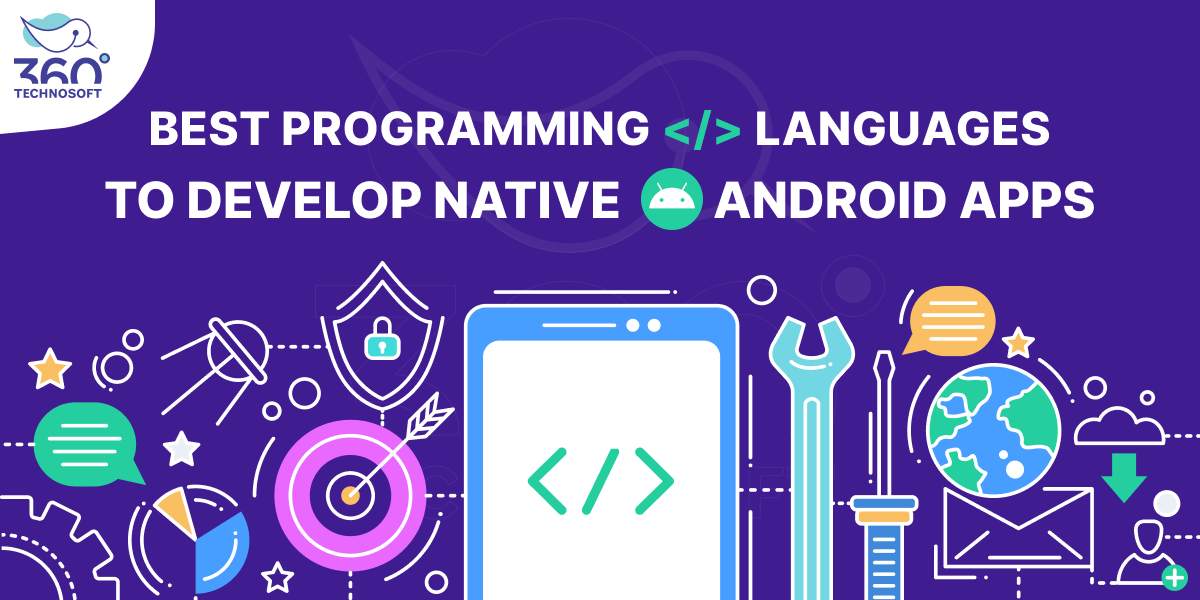As utilized by more than 70% of businesses around the world, Android app development is a mobile app development service that everyone is well-versed in. Being the most utilized OS in the world, there is a diverse range of Android programming languages essential for building Android apps that support businesses and users around the world.
However, this begs the question “Which programming language is used for Android application development?” The framework for multi-million dollar companies such as Google, Samsung, Sony, Nokia, and many more, Android & OS is the ultimate pit-stop for millions of software developers around the world.
To support this gigantic library of apps on which so many businesses rely, there are just two programming languages- Java and Kotlin, however, there are so many more languages than just these in the Android development marketplace.
What are Native Android Apps?
The apps that are specifically created and designed in a certain programming language are termed native mobile apps. These apps are performance-driven and provide reliable security to the user’s information. These apps have numerous benefits to them which are formidable factors as to why they are so in trend all the time while building an app with a specific OS.
Enhanced Performance
Due to them belonging to a specific platform, you compile these apps with the help of the platform’s main APIs and programming language. This is the reason why they are highly efficient, swift, and interactive to their users.
Seamless UX
These apps incorporate smooth user input and output experience. As they follow the same design guides of the OS they are being built for, it becomes an expeditiously interactive user experience as the app’s natural flow takes over in the OS.
Restricted Bugs
The probability of bugs existing in your program plummets. These apps get access to updated SDKs at the time of their release. These updates harbor newer and better features and ameliorations eliminating the chance of a bug existing in the program.
Robust Security
The security optimization of your app is much improved due to the presence of native apps since there are platform-specific in-built security features that are hard to bypass.
Feature Accessibility
Native apps can completely access the features of the device type to offer a better, more streamlined user experience.
Native Apps vs Cross-Platform Apps
Alongside the multitudes of Android development languages available to develop native apps, there are also a plethora of cross-platform apps that you can develop with the help of several other languages. The purpose of these apps is to function on multiple platforms i.e., Android and iOS both. However, there isn’t much difference between native apps and cross-platform apps.
| Criteria | Native Apps | Cross-Platform Apps |
|---|---|---|
| Development Time | Longer development time due to platform-specific code. | Shorter development time with code shared across platforms. |
| Performance | Superior performance as apps are optimized for specific platforms. | Slightly reduced performance due to abstraction layers. |
| User Experience | Offers seamless user experience with platform-specific UI/UX elements. | May have slight variations in UI/UX across platforms. |
| Maintenance | Requires separate maintenance for each platform, increasing costs. | Simplified maintenance with updates applied universally. |
| Access to Features | Full access to native device features and APIs. | Limited access to some native features, may require plugins. |
| Development Cost | Higher development cost due to platform-specific development. | Lower development cost with code reuse, but may increase with platform-specific enhancements. |
This table provides a comparison between native apps and cross-platform apps based on various criteria such as development time, performance, user experience, maintenance, access to features, and development cost.
Best Programming Languages for Native Android Apps
Curious about the languages and lines of code that Native Android Apps are written in? Or perhaps the best programming language to design your Android app? Below is a hand-picked list of the best programming languages to develop your dream Native Android App in.
1) Java
When it comes to Android programming language, Java is the first programming language that everyone prefers to work with. Also recognized as the most supported language by Google, the Java community is one of the most efficient communities when it comes to problem-solving programming issues.
Until the rise of Kotlin, Java was the most proficient native app-developing language for Android apps. It had all the qualities to be stable and secure, engaged in multi-threading, incorporated smart digital architecture, and was also portable. These reasons made Java rule the world of native Android app development.
Pros:
- Mature ecosystem with extensive libraries and tools
- Excellent platform compatibility and performance
- Large developer community for support
- Strong security features
Cons:
- Verbose syntax leading to longer development time
- Slower development compared to modern languages
- Higher memory consumption
- Lack of some modern language features
- Requires writing boilerplate code for common tasks
No matter how incredible and efficient Java as a programming language might be, it is still not a good Android programming language for beginners as it is much more complex than the others. Hence, people tend to turn towards much easier languages.
2) Kotlin
As Apple pivoted towards Swift as its main programming language, Google started to switch things up too. It introduced Kotlin and established it as the primary Android app development language for Native app development in 2017. Both these languages are easier and contain extensive libraries which simplifies things for a budding programmer.
Pros:
- Concise syntax leading to faster development
- Fully interoperable with Java, allowing seamless integration of existing code
- Improved null safety and type inference
- Enhanced support for modern language features like coroutines
- Officially supported by Google for Android development
Cons:
- Smaller ecosystem compared to Java
- Limited availability of libraries and tools
- Slower compilation speed compared to Java
- Learning curve for developers new to Kotlin
Considered a typed language, Kotlin can also run on Java Virtual Machine. It is also an open-source and multifaceted language used for Android app development that can compile faster and quicker than its original counterpart (Java). Multiple brands around the world are switching teams from Java to Kotlin due to its flexibility, speed, accuracy, security, and stability. Some of these brands are Uber, Pinterest, Netflix, and Basecamp. Its simple and easy-to-learn semantics make it a high preference from many programmers around the world.
3) C++
Besides Kotlin being the favorite child for Native App Development, both C and C++ are available on the Android Native Development Kit (NDK) as both are considered portable operating systems. To build a native app, both C++ and NDK are required. It also supports dynamic memory allocation to make things run quicker and be executed swiftly. This language is mainly preferred while developing high-intensity processor-based apps such as games.
Pros:
- High performance due to compiled nature
- Wide range of libraries and tools available
- Strong support for object-oriented programming
- Efficient memory management capabilities
- Cross-platform compatibility
Cons:
- Steeper learning curve compared to other languages
- More complex syntax and semantics
- Manual memory management can lead to memory leaks and bugs
- Limited support for modern language features compared to newer languages like Kotlin or Swift
Even though C++ can be quite beneficial in certain app development cases, it can be quite a hassle to set it up and is much less flexible than its other counterparts. Due to increased complications within the lines of code, it can also generate bugs. As a result, developers prefer Java or Kotlin as compared to C++ in their coding framework.
4) C#
C# is another language for Android app development that is similar to Java as it offers synonymous garbage collection in its framework so you can stop worrying about manually clearing memory or memory leaks. Microsoft developed a .NET language that allows the user to work on more than one project at a single time.
Pros:
- Robust and versatile language, suitable for a wide range of applications including game development, web development, and enterprise software.
- Strongly typed language with a rich set of features for object-oriented programming, making it easy to manage and organize code.
- Seamless integration with the .NET framework, providing access to a vast ecosystem of libraries and tools.
- Cross-platform compatibility through .NET Core and Xamarin, allowing developers to build applications for Windows, macOS, Linux, iOS, and Android.
- Comprehensive development environment with Visual Studio, offering powerful debugging and profiling tools.
Cons:
- Windows-centric development environment may limit cross-platform capabilities for some applications.
- Steeper learning curve compared to simpler languages like Python or JavaScript.
- Limited adoption outside of the Microsoft ecosystem, which may affect community support and third-party library availability for certain platforms.
- Requires the installation of the .NET framework or .NET Core runtime on target machines, potentially increasing deployment complexity.
One of the reasons why C# is preferred by native app programmers around the world is that Microsoft provides all the necessary tools required to develop an app in this language.
5) JavaScript
One of the best Android coding languages in the world and can be used in many diverse projects, JavaScript is famous for its quick and user-rich interfaces and experiences. Some cross-platform apps and frameworks utilize JavaScript. Some of them are Vue, React Native, and Angular.
Pros:
- Versatile and widely adopted language, used for both front-end and back-end web development, as well as mobile app development.
- Dynamic typing and flexible syntax make it easy to write and maintain code, particularly for rapid prototyping and iterative development.
- Vast ecosystem of libraries and frameworks, such as React, Angular, and Node.js, provide robust tools for building web and mobile applications.
- Cross-platform compatibility allows JavaScript code to run on virtually any device with a web browser, making it ideal for developing web-based applications.
- Active and supportive community with extensive documentation, tutorials, and online resources available for learning and troubleshooting.
Cons:
- Asynchronous programming model can lead to callback hell and complex code structure, particularly in large-scale applications.
- Lack of strict typing can result in runtime errors and debugging challenges, particularly in larger codebases.
- Performance may be slower compared to statically typed languages like Java or C++, particularly in CPU-intensive applications.
- Security vulnerabilities such as cross-site scripting (XSS) and injection attacks are common, requiring careful attention to security best practices.
- Fragmented ecosystem with frequent updates and new frameworks may lead to compatibility issues and dependency management challenges.
The most riveting thing about JavaScript is that offshoot frameworks like jQuery, Angular, Vue, React.js, and Svelte made the framework even more famous than usual. It is also considered by many the best language for client-side validation which skyrockets its significance.
Many other frameworks have emerged from JavaScript too however, the popularity that JavaScript holds is unparalleled in programming in the world.
6) Python
Another object-oriented, complex language with dynamic mechanisms, Python is quite a convenient programming language that enhances compiling time. Its large open-source community leaves room for highly secure and fail-proof libraries and frameworks.
Pros:
- Simple and readable syntax makes it easy to learn and write code, enhancing developer productivity and reducing development time.
- Versatile language used for a wide range of applications, including web development, data analysis, machine learning, artificial intelligence, and automation.
- A large standard library and extensive third-party package ecosystem (PyPI) provide a wealth of tools and libraries for various tasks, reducing the need to write code from scratch.
- Strong community support with active forums, documentation, and tutorials, making it easy to find solutions to problems and learn new concepts.
- Cross-platform compatibility allows Python code to run on different operating systems without modification, increasing portability and scalability.
Cons:
- Slower performance compared to compiled languages like C++ or Java, particularly for CPU-intensive tasks.
- Global interpreter lock (GIL) limits multi-threading performance, hindering performance in multi-core environments.
- Not as suitable for mobile app development compared to languages like Swift or Kotlin, although frameworks like Kivy and BeeWare provide options.
- Weak in mobile computing and game development, where performance and resource efficiency are critical.
- Lack of backward compatibility between major versions (Python 2 vs Python 3) can lead to code migration challenges and compatibility issues.
Know one or Know It All?
So which one is the best language used for Android app development? To understand a single programming language and be a maestro in that specific framework or to diversify your knowledge about programming languages and be an experienced developer in all of them?
As the demand for Android apps rises, the demand for Android developers also elevates at the same time. The best way to thrive in the dynamic world of programming languages is if both are done equally. A developer should be well-versed with one or two languages in general along with having a general understanding of other languages as well since different situations require different tools.
Following that, specialization in a single domain leads to difficulty in learning others when the market shifts. Something like this happened in 2017 with Kotlin being the much more preferred language by Google. As a result, it is generally better for an Android developer to focus on more than one language (Kotlin and Java) along with other multi-faceted baseline programming languages such as JavaScript and C/C++.
Time is Taken to Study Android App Programming
Just like how mastering anything else takes much time, Android App Programming is no exception to that rule. It takes anywhere between 3-4 months to have a basic understanding and knowledge and another year to have some serious mastery over the language. However, this time is exponentially increased for more experienced programmers.
Mobile App Development Tools and Platforms
Understanding the different programming languages is always partnered with knowing about the different Android App Development tools and platforms.
It is almost a tradition for coders and programmers to consider IDE (Integrated Development Environment). This is considered to be a platform that has a combined and unified purpose specifically to create a diverse range of software.
An amalgamation of multiple tools such as a text editor, in-built automation, compiler or interpreter, and debugger is what comprises a good framework. Regardless of the subscription of the service, they incorporate amazing development tools.
1) Xamarin
A famous Microsoft platform, Xamarin utilizes C# which is one of the best programming languages used for the development of cross-platform environments.
2) Flutter
Flutter Considered an open-source UI software development kit (SDK), Google built this particular platform to build and compile native apps for several platforms such as mobile, desktop, and web from a primary codebase.
3) React Native
Another cross-platform app builder, React Native was founded by Facebook that strictly utilizes JavaScript and React. This is a famous JavaScript library that is used to develop user interfaces.
4) Angular
Another open-source front-end framework developed by Google is generally used to develop single-page applications (SPAs) that are dynamic and robust. Angular contains its own complex set of libraries and tools that allow the programmer to develop its native apps with data-centric user interfaces.
5) mBaaS
Mobile Backend as a Service (mBaaS) deals in cloud computing that allows developers to build a scalable and flexible backend platform that offers support to mobile applications. mBaaS aids in eliminating the issues of backend development and simplifies frontend development in the process of developing an interactive user experience for the app.
Conclusion
Keeping in mind the merits and demerits of a programming language, these are some of the best programming languages for Android development in the world. While picking one or multiple as your expertise make sure you understand the benefits and drawbacks of each of them and pick accordingly.
Picking the right software to develop an Android app is much easier than meets the eye. However, if you find yourself not going the general way that programmers work, it is fine. Many programmers in the world prefer C, C++, and Basic over Java and Kotlin when it comes to developing Android apps. Make sure you research properly and pick the one that best suits your needs.
Frequently Asked Questions (FAQ’s)
1) What different languages are utilized to build Android Apps?
The majority of the native apps in Android App Development are made from languages like Java and Kotlin. In particular cases, some other languages such as C, C++, and Basic are used as well.
2) Can we use C++ as a programming language to develop Native Android Apps?
In particularly rare occasions, C++ can be used as the programming language to develop native Android apps. However, setting up this language is quite complex to accomplish since it can lead to more bugs and issues. As a result, Java is generally preferred over C++.
3) Why is Kotlin preferred for Native Android App Development?
Kotlin is preferred by the majority of native Android app developers due to several reasons. Precise code, lower development cost, security of code, and targeting enterprise technology are some of the reasons why Kotlin is much more efficient and favored by Native Android App Developers.
4) Is C a good language to develop Android apps in?
Google provides the NDK (Native Development Kit) featuring languages like C and C++. However, it is impossible to develop a native app just by utilizing the above languages. Java is a necessity in this case.
5) Which language can be learned the quickest for Android app development?
Since the Android OS was invented in Java, it is considered to be the easiest programming language, hence, can be learned in the quickest time. It is also much quicker and compiles more swiftly than Python and other different languages due to its simple-to-learn syntax.



require a lot less effort than the native apps. However, their functioning is also great than the native applications. Unlike native apps, it does not require multiple codebases. That means that these applications can.